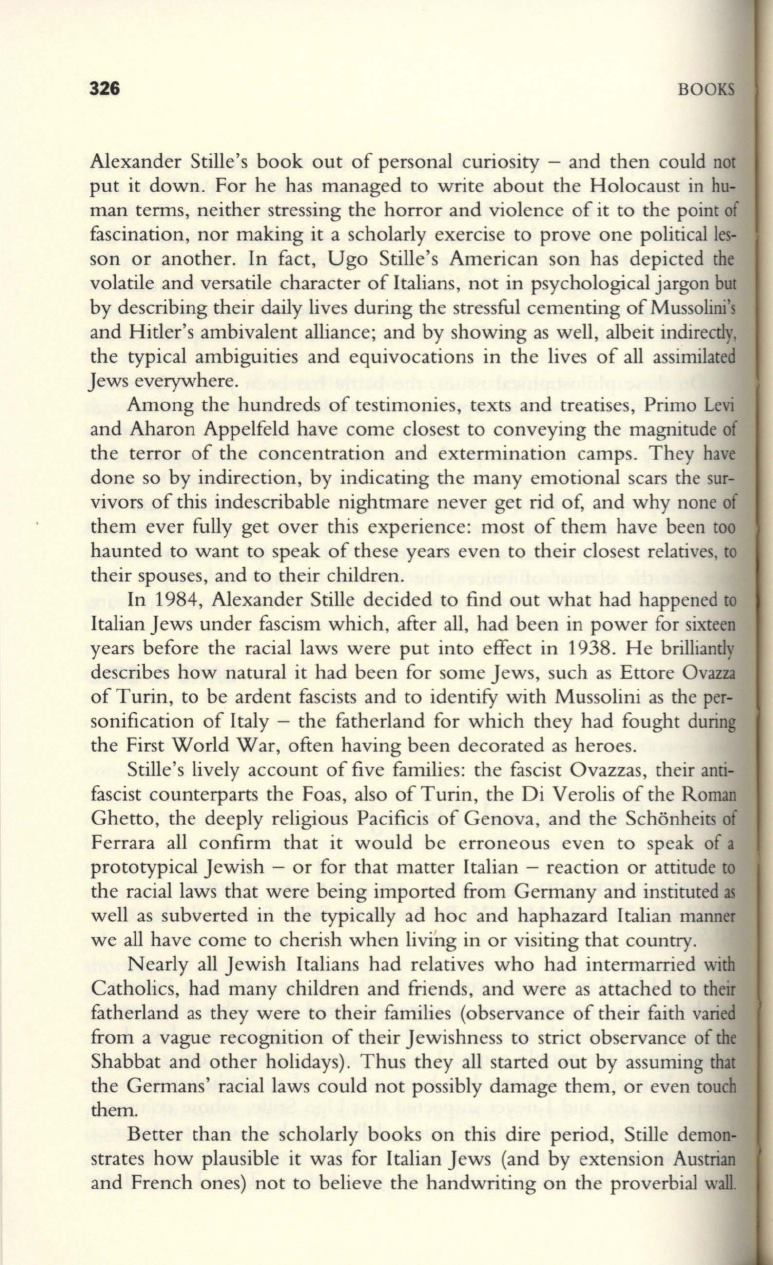
326
BOOKS
Alexander Stille's book out of personal curiosity - and then could not
put it down. For he has managed to write about the Holocaust in hu–
man terms, neither stressing the horror and violence of it to the point of
fascination, nor making it a scholarly exercise to prove one politicalles–
son or another. In fact, Ugo Stille's American son has depicted the
volatile and versatile character of Italians, not in psychological jargon but
by describing their daily lives during the stressful cementing of Mussolini's
and Hitler's ambivalent alliance; and by showing as well, albeit indirecdy,
the typical ambiguities and equivocations in the lives of all assimilated
Jews everywhere.
Among the hundreds of testimonies, texts and treatises, Primo Levi
and Aharon Appelfeld have come closest to conveying the magnitude of
the terror of the concentration and extermination camps. They have
done so by indirection, by indicating the many emotional scars the sur–
vivors of this indescribable nightmare never get rid of, and why none of
them ever fully get over this experience: most of them have been too
haunted to want to speak of these years even to their closest relatives, to
their spouses, and to their children.
In 1984, Alexander Stille decided to find out what had happened to
Italian Jews under fascism which, after all, had been in power for sixteen
years before the racial laws were put into effect in 1938. He brilliandy
describes how natural it had been for some Jews, such as Ettore Ovazza
of Turin, to be ardent fascists and to identify with Mussolini as the per–
sonification of Italy - the fatherland for which they had fought during
the First World War, often having been decorated as heroes.
Stille's lively account of five families: the fascist Ovazzas, their anti–
fascist counterparts the Foas, also of Turin, the Di Verolis of the Roman
Ghetto, the deeply religious Pacificis of Genova, and the Schonheits of
Ferrara all confirm that it would be erroneous even to speak of a
prototypical Jewish - or for that matter Italian - reaction or attitude to
the racial laws that were being imported from Germany and instituted as
well as subverted in the typically ad hoc and haphazard Italian manner
we all have come to cherish when living in or visiting that country.
Nearly all Jewish Italians had relatives who had intermarried with
Catholics, had many children and friends, and were as attached to their
fatherland as they were to their families (observance of their faith varied
from a vague recognition of their Jewishness to strict observance of the
Shabbat and other holidays) . Thus they all started out by assuming that
the Germans' racial laws could not possibly damage them, or even touch
them.
Better than the scholarly books on this dire period, Stille demon–
strates how plausible it was for Italian Jews (and by extension Austrian
and French ones) not to believe the handwriting on the proverbial wall.


